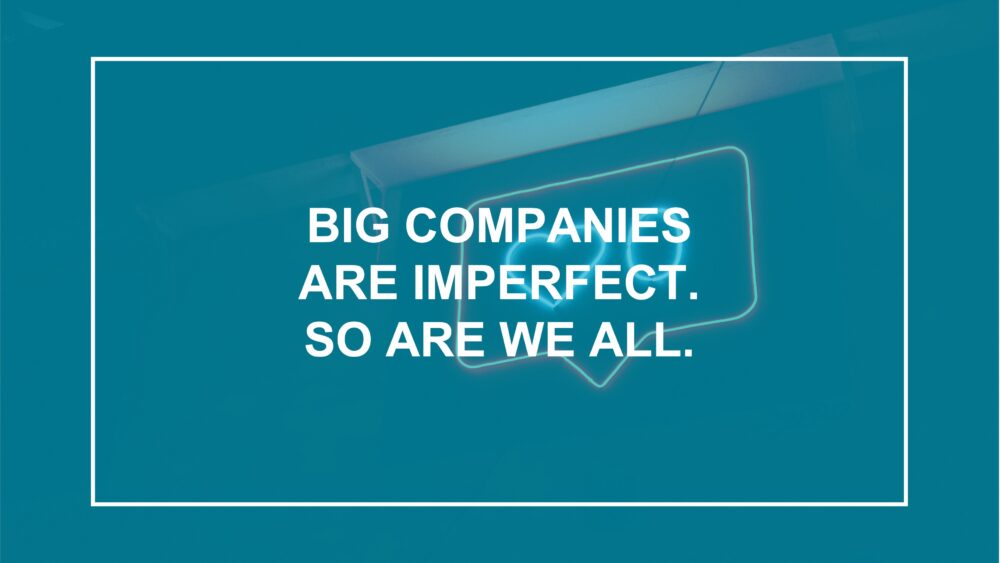Big Companies are Imperfect. So Are We All.
A few weeks back I was on a call in which a leader from an established, growth-stage startup was explaining the company’s business model to a group of people he didn’t know via Zoom. The specifics aren’t important; his job was to give a broad explanation of the company’s business so that this group could get involved in a logical way with the company.
Great. Cool. Happens all the time. Overviews like this are given in investor conversations, public presentations, and countless other contexts.
The company leader was engaging with the virtual audience, and he explained that if the company succeeds in its mission, one category of the economy gets hurt. Who, he asked, loses money? The answer he was waiting for came: search engines and social networks that sell advertising lose out.
“That’s right,” he said with excitement. “So if we win and Mark Zuckerberg makes less money, that’s nothing I’m going to lose any sleep over.”
This last riff was uttered quickly, with a tone of ease, as if it was a punch line for a startup standup routine.
It rubbed me the wrong way.
The speaker made two assumptions. First, judging by his nonchalance, he assumed that it was just obvious that everyone in this group would agree with him. It seemed he thought his conclusion was not only obviously true but so true as to be funny. Second, he assumed it was a-okay to say this statement aloud to a group of people he had never met.
Ick. Really. Ick.

I don’t need to be hero’ing Mark Zuckerberg and the millions of other investors who still hold Facebook stock. I imagine they’re fine. But when I go back to 2007 and think about the countless things Mark Zuckerberg and the brilliant people he enlisted did to build a quite compelling company, I think using that company as a simplistic punchline is inaccurate. Most importantly, I think promoting your business on the premise that people will LIKE your company MORE because its gains are the losses of Facebook and Google is foolhardy.
I haven’t met every startup founder or CEO, but most of the ones I’ve met would be downright thrilled if their companies enjoyed one one-thousandth of the economic and cultural success Facebook created.
And, hey, if you want to use the argument that your business has major upside because it replaces sub-optimal online advertising performance, that’s fine! You can dial your plan toward that objective without throwing a game-changing company under the bus. Again, I don’t care about Facebook saving face; it’s just that by insulting such a globally meaningful company, this speaker came across as ignorant.
And he assumed I was right there with him on the “duh” diatribe. I am not. I am way more than old enough to remember the magical moment when Facebook opened its doors to people who weren’t enrolled in elite universities. I was elated. I built and advised countless companies that built their businesses through smart use of Facebook and Google advertising. I also have been around to see tens of companies who have said they were making a great/better/tolerable Facebook raise a ton of money and fade away, unnoticed.
I guess I just dislike the idea that once something becomes great, it seems to some that it’s open season to treat that thing as a punching bag. I see this approach as naive at best and weak at worst.
I can’t count the number of companies that pitched me individually or as part of the MergeLane Fund with this strategy. “You could use Craigslist if you are okay getting murdered.” …Really? I have said no every time.
Companies and people that do great things are imperfect. If you want to be better or to win against such a person or business, your rationale better be far more sophisticated than a public cheap shot.
Any thoughts, feelings, or blurts? Share them here.


